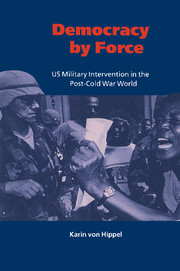2 results in London School of Economics Mathematics

Advanced Mathematical Methods
-
- Published online:
- 05 June 2012
- Print publication:
- 25 January 1991

Democracy by Force
- US Military Intervention in the Post-Cold War World
-
- Published online:
- 22 September 2009
- Print publication:
- 09 December 1999

